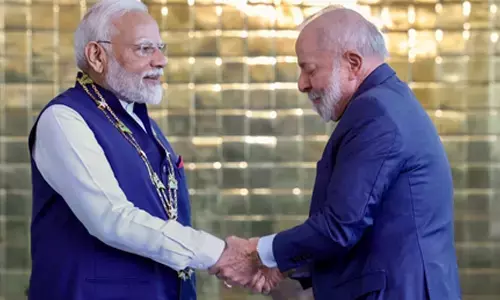Jihad - How Un-Islamic it is

Jihad - How Un-Islamic it is, Thirty-nine from India left their homes for pilgrimage to West Asia but entered Iraq and Syria to join the ISIS fight.
Bengaluru-based Mehdi Masroor Biswas's arrest after Britain's Channel Four identified him as the man behind "ShamiWitness", the Twitter handle followed by thousands of people including most foreign fighters for the Islamic State of Iraq and Syria (ISIS) has underscored the role Indian youths are playing in promoting the group’s ideology.
Thirty-nine from India left their homes for pilgrimage to West Asia but entered Iraq and Syria to join the ISIS fight. Over the past few weeks, there have been many reports about foreign militants who, after leaving their countries to join the radical ISIS, are disillusioned and are keen to return home.
One of the returnees, Areeb Majid of Kalyan near Mumbai, has said that Indians are not considered tough enough for combat role and are made to do minor jobs. Hopefully, this would dissuade others from India, and elsewhere, from joining the fight.
These youths need to ask themselves: Does this fight belong to them or even their community? They need to ponder whether Al Qaida, the Taliban and now ISIS are merely taking advantage of the general anti-West sentiment prevailing among Muslims for a variety of reasons.
It is possible for them to look back since many of these recruits are young professionals. They are perhaps better informed about the state of affairs in the Muslim world, and better funded.
Viewed dispassionately, there’s more to life than running halfway across world taking up what seems a lost cause which can only result in destruction and loss of innocent lives. Expecting a life of glory and martyrdom, some of them found instead a life of menial labour and were expected to perform ‘valorous deeds’ such as cooking rice and cleaning plates.
This is not what American actor Sylvester Stallone portrayed when he played Rambo against the supposedly marauding Soviet forces in Afghanistan through the 1980s, a filmy fantasy of epic proportions created by the Americans to justify and glorify their role in that war-torn country.
The time is ripe but this is not the place to dwell over the role of the US and NATO in Afghanistan, from where they are evacuating (the word is used consciously) after 13 years. Of their heroes of yore, they turned Osama bin Laden into a villain and eliminated him. Many more remain in the fight, which they are quitting. It would be better to focus on the heroes-turned villains and their growing numbers now commandeered by the ISIS, selling them an uncertain Islamic Utopia.
Why do these youths join the Al Qaida or the ISIS? Many from Europe have spoken of their need for meaning and value in life, a need for recognition and respect, which they claimed they did not have in the West (and apparently not in the East either, as it has turned out). Underlying these phenomena is the problem of alienation and isolation, which is as old as modernity itself.
While sympathizing with their plight, it is essential to tell them that: a) one does not get rid of the humdrum routine of modern life by escaping into a fantasy of glorious violence and radical extremism; and b) they should certainly not use religion as an excuse for such escapism.
Assuming these men genuinely believe that what they have been doing has been for the good of their faith, then they should ask themselves the simple question: how violence that causes destruction of civil architecture, the breakdown of law and order, the killing of unarmed innocents, kidnapping and raping of women and children can possibly be good for the religion they profess.
Are these foreign fighters the new Rambos? Or, do they need this stereotype to prove their physical and mental prowess or their dedication to their faith? And, did Rambo, while annihilating their supposedly common adversary (on cinema screen) achieve anything that they should persevere for?
These would-be jihadis need to study Muslim history to determine if they have chosen the right role models. For, as per this history, much of the life of the Prophet was spent in negotiation, dialogue and building bridges between different communities.
They should consider Islam’s legacy of scientific research and analysis of notable scholars such as Ibn Khaldun, al-Ghazali, Ibn Sina and Al Biruni. Their lasting contribution has benefited the human race as a whole. They were men who chose to write books rather than burn them and bomb libraries.
None of these scholars advocated Rambo’s path that is being copied mindlessly today. They all chose the life of dedicated labour and quiet perseverance instead.
While knowledge is universal, for the jihadists, current and the intending ones from India, there are recent examples closer home. One is from Darul Uloom, Deoband, that has repeatedly declared as un-Islamic all forms of violence, including terrorism. Other Indian Islamic theologians have also pronounced themselves against violence. Hyderabad was the venue of a massive rally a couple of years ago, where an estimated congregation of three lakhs took a pledge against terrorism.
Assuming that joining this so-called jihad is an individual decision, it must be judged in the light of the individual’s responsibility towards his own family and society. Before joining Al Qaida, ISIS or any of the groups, be they in Asia, Africa or Europe, the individual needs to understand and reassess the notions of success, bravery and purpose and meaning in life.
This is because these men have abandoned their families and the responsibilities that go with such attachments, to join a foreign cause that is alien to their own immediate needs and circumstances. The abandoned families are left to fend for themselves and deal with the consequences alone. Surely, the true test of manhood and masculinity lies in fulfilling one’s moral and filial obligations, and labour in the face of adversity.
For too long, masculinity has been defined in terms of machismo, aggression and the propensity to act violently. Yet, it could be argued that true masculinity lies in the stronger capacity to resist violence, to shoulder burdens with dignity, to carry out responsibilities with honour, and thus gain respect for being a real man.
There can be no sympathy whatsoever for men who abandon their families to go and fight some romantic war hundreds of miles away when their real duty lies at home with their families and co-workers.
Instead of playing “Rambo” and committing murder in foreign countries, try raising your children and give them education and enlightenment. Let them grow to be mature, responsible citizens. This might seem boring, but that is where true dedication and heroism lie.
By: Mahendra Ved















